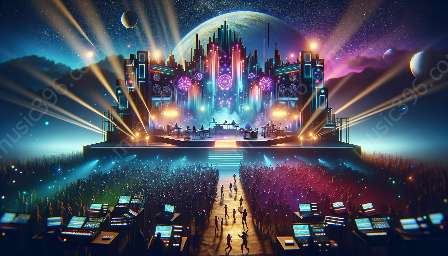Electronic music has significantly influenced pop culture, and advances in artificial intelligence (AI) are revolutionizing the way music is composed, produced, and experienced. This topic cluster explores the intersection of AI and electronic music creation, as well as the influence of electronic music on pop culture.
The Influence of Electronic Music on Pop Culture
Electronic music has had a profound impact on pop culture, spanning from its roots in the 20th century to its widespread influence today. Its pulsating beats, synthesizers, and experimental sounds have permeated various genres, from mainstream pop to underground subcultures. The rise of electronic dance music (EDM) festivals and the integration of electronic elements in popular songs have contributed to electronic music's global appeal.
Moreover, electronic music has shaped fashion, art, and the club scene, fostering a vibrant subculture that continues to influence mainstream culture. Its influence can be seen in the fashion choices of music artists, the visual aesthetics of music videos, and the design of nightclubs and music venues.
Artificial Intelligence and Electronic Music Creation
As technology advances, AI is becoming increasingly integrated into the music creation process, particularly in the realm of electronic music. AI algorithms and machine learning techniques are being used to generate, remix, and even perform electronic music. This fusion of AI and electronic music creation is pushing the boundaries of artistic expression and changing the way music is composed and consumed.
AI-Generated Music
AI-generated music involves the use of algorithms to compose original pieces of music without direct human intervention. These algorithms analyze massive datasets of musical compositions, identify patterns, and generate new melodies, harmonies, and rhythms. The ability of AI to create music autonomously raises questions about creativity, authorship, and the role of human musicians in the digital age.
AI-Assisted Music Production
AI is also revolutionizing the production process by assisting musicians and producers in sound design, mixing, and mastering. AI-powered tools can analyze audio signals, identify patterns, and offer creative suggestions for enhancing music production. This streamlines the production workflow and provides new creative possibilities for artists and producers.
AI-Integrated Live Performances
Furthermore, AI is being integrated into live music performances, blurring the lines between human musicians and AI-driven systems. AI-powered machines and software can dynamically respond to audience feedback, adjust musical elements in real-time, and create immersive audio-visual experiences. This innovation challenges traditional notions of live music performance and opens new avenues for artistic experimentation and audience engagement.
Future Implications and Ethical Considerations
The advancement of AI in electronic music creation raises important ethical and societal considerations. As AI becomes more proficient at emulating human musical creativity, questions arise about the authenticity and uniqueness of AI-generated music. Additionally, issues related to copyright, intellectual property, and fair compensation for AI-generated content need to be addressed to ensure a fair and sustainable music ecosystem.
Furthermore, the democratization of music creation through AI tools may lead to a shift in the power dynamics of the music industry. Emerging artists and independent musicians can leverage AI technology to produce high-quality music with limited resources, potentially disrupting the traditional music production hierarchy.
Conclusion
The convergence of AI and electronic music creation is reshaping the music landscape, offering new avenues for artistic expression and challenging conventional practices. As electronic music continues to weave its influence into pop culture, the integration of AI presents both opportunities and challenges for musicians, producers, and music enthusiasts alike.


